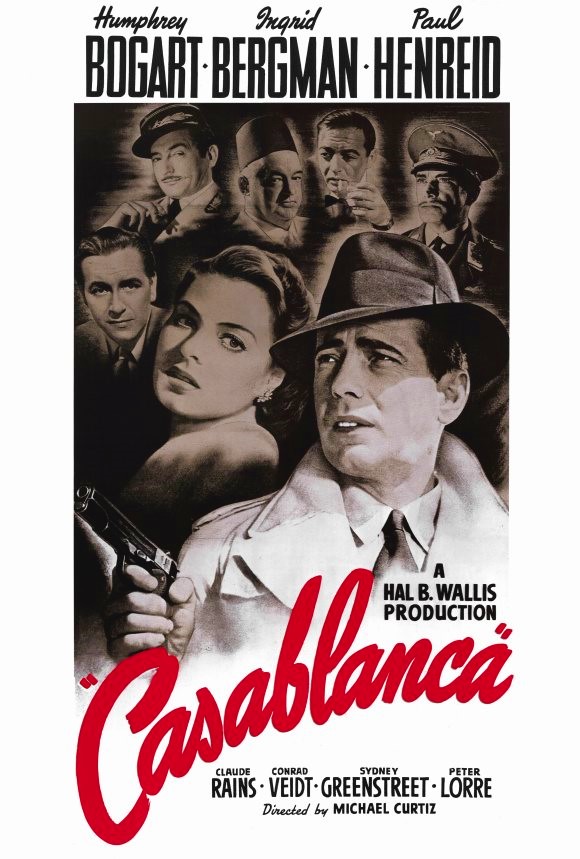“Casablanca” is a war movie released in 1942 to coincide with Operation Torch and the liberation of Casablanca that same year. It is based on an unproduced play entitled “Everybody Comes to Rick’s”. Shockingly, several writers adapted it which flies in the face of multiple writers signaling problems. It was directed by Michael Curtiz. It was Bogart’s first romantic role. In spite of the chemistry between him and Ingrid Bergman, they never made another film together. Only three American actors have roles. Many of the extras were Jewish refugees. It was filmed at the studio. The Production Code Administration had all direct references to sex removed from the script. (Note to current television writers, it is possible to be sexy without beating the audience over the head.) It won three Oscars (Picture, Director, Screenplay) and was nominated for Actor (Bogart – robbed by Paul Lukas (who?) in “Watch on the Rhine”!!), Supporting Actor (Rains – robbed by Charles Coburn in “The More the Merrier”!), Cinematography (how did it lose that one?), Editing, and Music. There was only half-hearted talk of a sequel. Times change.
The film opens with a narrator explaining the situation in Vichy-controlled Morocco. For those unfamiliar with World War II, when France fell to Germany in 1940, the southern part of the nation remained quasi-independent. It had to be very Fuhrer-friendly or it would be his next meal. Morocco was a colony of France. It is a transit point for refugees hoping to get to Portugal and then to safety in America. Most are stuck and waiting…waiting…waiting… The search is on for the murderer of two Nazi couriers. The criminal has taken two “letters of transit” which will fetch a great price. Capt. Renaud (Rains as the local Vichy police chief) is rounding up the usual suspects.
At Rick’s Café Americain, the cynical expatriate Rick Blaine is visited by Ugarte (Peter Lorre) who is a petty criminal who has the two letters of transit for sale. Czech Resistance leader Victor Laszlo (Paul Henreid) arrives in Casablanca. He has escaped from a concentration camp and is on the lam. He is accompanied by his wife Ilsa (Bergman). He needs the letters of transit. The typically loathsome Nazi Maj. Strasser (Conrad Veidt – an anti-Nazi who had fled Germany) of the Gestapo is in town to get Laszlo, but cannot simply arrest him in Vichy jurisdiction. When Ilsa asks the house piano player Sam (Dooley Wilson – a drummer who could not play the piano) to play “As Time Goes By”, Rick realizes his ex-lover is in town. Cue the romantic triangle wrapped in a lot of intrigue.
ACTING: A
ACTION: N/A
ACCURACY: N/A
PLOT: A
REALISM: B
CINEMATOGRAPHY: B
SCORE: A
BEST SCENE: the dueling anthems
BEST QUOTE: Renault: Carl, see that Major Strasser gets a good table, one close to the ladies.
Carl: I have already given him the best, knowing that
he is German and would take it anyway.
ACCURACY: Accuracy is not really an issue. It
does not claim to be based on a true story. The general outline is accurate.
Morocco in 1941 was officially part of Vichy France and thus technically out of
Nazi jurisdiction. Casablanca was a transit point for European refugees trying
to get to Portugal and then to America. It seems likely that under real
circumstances the Gestapo would have had less scruples about eliminating a
resistance leader like Laszlo. The “letters of transit” were a fictitious plot
device. In my opinion, one of the most accurate statements in the movie is made
by Ferrari (Sidney Greenstreet) who is Rick’s shady-operator rival. He opines:
“My dear Rick, when will you realize that in this world today, isolationism is
no longer a practical policy?” The screenwriters obviously agreed with that
sentiment, as did FDR who screened the movie in The White House (la casa
blanca).
CRITIQUE: “Casablanca” is one of the top five
movies of all time. It is one of the few “classics” that holds up for modern
audiences. The dialogue is crackling. Numerous quotes are among the greatest in
movie history. The acting is top notch. Bogart is at the top of his game and he
is matched by Bergman. Rains is outstanding in the best performance of his
career. The only downer is Henreid’s stiff performance, but that was partly due
to the saintliness of the character. You throw in Strasser, Lorre, and
Greenstreet and you have an amazing cast. The musical score keeps pace with the
acting. The song “As Time Goes By” is justifiably one of the most memorable in
cinema history. The cinematography is awesome. Bergman’s face is shot in such a
way to highlight her conflicting emotions. The darkness and shadows give the
film a film noir feel. The theme of sacrifice resonated in WWII America,
but can be understood at any time. The cynic who does the right thing may
be stereotypical, but Bogart set the template for it. This is an adult
movie for adults.

There is so much to love about this film. In addition to the strong performances by Bogart, Bergman, and Rains there is a charming ensemble of supporting characters giving an international atmosphere to the place. I think I would normally be bothered by the fact that some of the accents don't match up with the supposed nationalities but the quality of the acting and the dialogue make it easy to suspend disbelief.
ReplyDelete